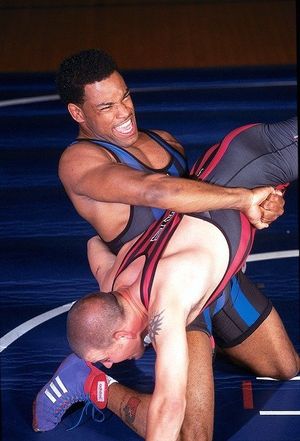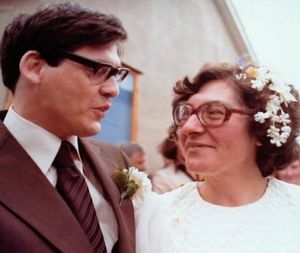I remember how, years ago, I sat with my father on a Saturday afternoon watching wrestling on the television. Names such as Big Daddy and Giant Haystacks still spring to mind! In this article I invite you to join me at the ringside of an unusual wrestling match – more remarkable than any contest I watched as a boy.
The venue: by the river Jabbok, a tributary of the Jordan in Canaan. The contestants: a ninety-seven-year-old Jew named Jacob, and a mysterious man, who refuses to give his name. The time: all night until sunrise.
For most of the combat, Jacob seems to be winning, but eventually the stranger dislocates the Jew’s hip. The man tries to leave as the sun comes up in the sky, but Jacob refuses to let him go. The stranger rewards his antagonist for his persistence and even gives him a new name. We read about this extraordinary wrestling match in Genesis 32.
The contestants
Let’s look more closely at these two wrestlers. The first is Jacob, returning from the home of his father-in-law Laban in Haran (Genesis 32:24). Jacob faces the frightening prospect of meeting his twin brother Esau who, twenty years before, had threatened to kill him.
Jacob’s thoughts flashed back to how he had twice cheated Esau. He had stolen his brother’s birthright; and then later, with the connivance of his mother Rebekah, he had robbed Esau of the blessing of Isaac, their blind father (Genesis 25 and Genesis 27).
But the evening before he is to face his brother, Jacob, alone at Jabbok, meets an opponent more powerful than Esau. He is enigmatically called ‘a man’ in Genesis 32:24; he is the second of the contestants in this astonishing wrestling match.
Who was this mysterious man? He had said, ‘You have struggled with God’, while Jacob declared, ‘I saw God face to face’ (Genesis 32:28,30). Evidently, it was God himself who wrestled with Jacob at Jabbok. To emphasise the point, Jacob renamed the place ‘Peniel’ which means ‘Face of God’.
However, the man was also ‘the angel of God’ who spoke to Jacob in the house of Laban and identified himself as ‘the God of Bethel’ (compare Genesis 31:11-13 with Genesis 28:10-22).
If he is God, why is he called an angel? Angel means messenger; this wrestling man was the messenger of God to Jacob. It was the pre-incarnate Christ with whom Jacob wrestled at Jabbok. This incident in Genesis 32 is one of several ‘theophanies’ (appearances of God in human form) in the Old Testament. This was the only way in which Jacob could see the glorious God and live (Genesis 32:30).
The match
Why did God wrestle with Jacob? To teach Jacob to depend on the Lord and not to rely on his own cleverness. Hosea 12:2-5 gives us a key to interpret this dramatic episode in Jacob’s life. The prophet tells us that Jacob ‘wept and begged for [God’s] favour’ at Peniel. Genesis 32, then, teaches us something about prayer.
We are not to infer that God is reluctant to grant our requests, resisting our prayer by wrestling against us. It is rather that he tests our earnestness when we come to him with our petitions.
It was only when Jacob sent his family and possessions ahead, and spent time alone in prayer, that God came to him in a way that he did not expect (Genesis 32:23-24). Jacob had a journey to complete and a family to care for. Nevertheless, he made time to pray. Are we too busy for God to speak to us?
Remarkably, God gave Jacob, the weak sinner, power to prevail (Genesis 32:28). The almighty God allows us to come with boldness to his throne and, in a way which we do not understand, uses our prayers in the fulfilment of his sovereign will.
God’s mighty blessing
At the culmination of the struggle, Jacob realised that his opponent was more than a man. With a mere touch he dislocated Jacob’s thigh, the strongest joint in the whole body. It was then Jacob realised his own weakness. A close encounter with God can be painful. What God discovers within us and reveals to us may not be pleasant!
As the wrestling match continued the divine wrestler asked Jacob to let him go. Why did he make this request? Let me suggest two reasons. Firstly, this combat was private and personal, and not for the eyes of Jacob’s fellow-travellers (Genesis 32:22).
Another reason for the request ‘let me go’ was because Jacob could not see God’s face and live (compare Genesis 32:33 with Exodus 33:20), and daylight would uncover God’s face.
Jacob’s reply to his adversary was, ‘I will not let you go unless you bless me’. And he received what he asked! ‘He blessed him there’, we read (Genesis 32:26-29). We need the same determination and perseverance in prayer.
A new name
‘What is your name?’ the angel asked Jacob. Because the angel is God, he already knew Jacob’s name, so why ask the question?
Jacob had to give his name, not to tell God, but as a confession of his sinful past. ‘I’m Jacob’, he says, and the name means ‘deceiver’. But upon this confession, God renames him ‘Israel’, which means ‘prince with God’ (Genesis 32:27-28). Jacob fought with God and would in the future fight for God. A new name marked a new nature and anticipated Jesus’ teaching on the new birth in John 3.
But Jacob also has a question. ‘Please tell me your name’, he pleads (Genesis 32:29). He was almost sure of the identity of the wrestler but he wanted full confirmation. God’s answer came not in words, but with a special blessing: ‘Then he blessed him there’.
God’s blessing of Jacob indicates that the patriarch’s plea was more than a request to know a name. He longed for a deeper understanding of God. Do we long to know God better and to walk closer to him?
Just as the sun rose over Peniel (Genesis 32:31), so ‘a new day of light and of hope was dawning for Jacob after the night of gloom and despair’ (Leupold). Jacob, at peace with God, leaves Jabbok to make his peace with Esau.
How feeble our prayers seem compared to Jacob’s wrestling with God! Nevertheless, God delights to hear the prayers of all his people and is more ready to give than we are to receive.















